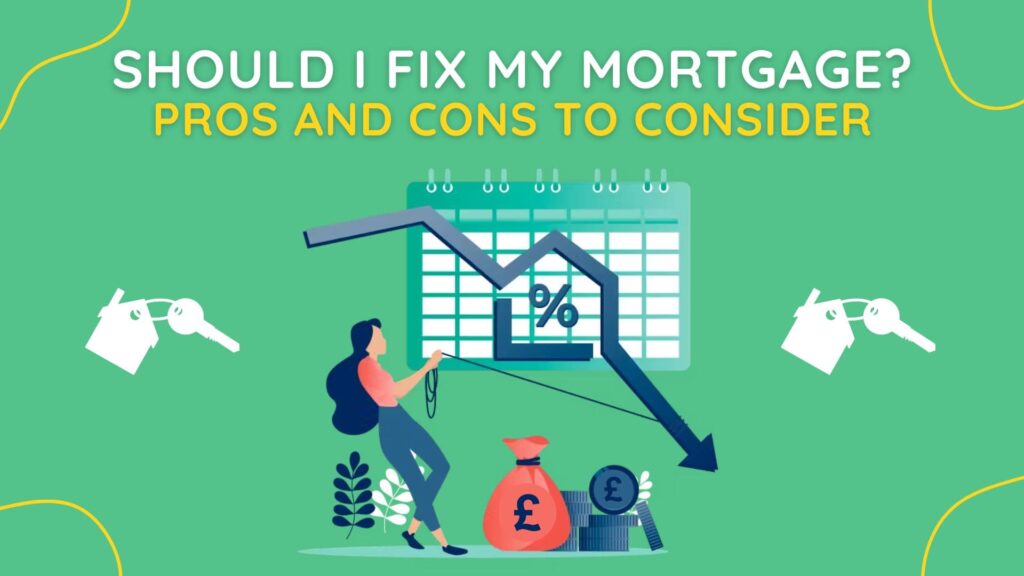
Sammie Ellard-King
I’m Sammie, a money expert and business owner passionate about helping you take control of your wallet. My mission with Up the Gains is to create a safe space to help improve your finances, cut your costs and make you feel good while doing it.

Quickfire Roundup:
If you’re seeking peace of mind and stability, a fixed rate mortgage is probably the best option for you.
With a fixed rate, you’ll usually benefit from lower interest rates, and you’ll know that your monthly repayments are going to stay the same.
There are pros and cons to this approach, but overall a fixed rate deal is the best option for the majority of homeowners.
The real question is what should you do right now? And the answer I’m afraid is it depends… and i’ll explain why.
Grab a cuppa, put up your feet, and let’s dive into the thrilling world of mortgages. I know, I know. It sounds about as exciting as watching paint dry, right?
But hey, this is your hard-earned money we’re talking about here, and we want to make sure every penny is put to good use.
So, whether you’re buying your first abode or considering remortgaging, you’re probably mulling over that age-old question, “Should I fix my mortgage?”
Now, securing the right mortgage deal is a bit like finding the perfect pair of jeans – it should fit just right, and make you feel comfortable and confident. However, it’s not always easy to know what’s right for you.
That’s why chatting with a mortgage broker is as essential as having a GPS on a road trip. They’ll help you navigate the winding roads of your personal financial situation.
Hold on tight because we’re about to take a fun-filled ride into the world of mortgage deals.
We’ll explore the rollicking rollercoaster of pros and cons and even take a detour into the vibrant villages of variable rate mortgages, tracker mortgages, and discounted mortgage rates.
Table of Contents
Should I fix my mortgage and what does a fixed rate mean?
Whether you fix your mortgage rates or not is all down to your circumstances.
A mortgage broker can help you to find the mortgage deals that best suit you, but generally speaking fixed-rate mortgages come with lower interest rates and offer a degree of security: you can be sure of what your mortgage payments are going to be for a period of time.
How soon can you remortgage before your fixed rate ends? Well, you can start shopping before hand but start applying from 6 months out.
That being said in the current landscape with interest rates rising some people are weighing up fixed rate vs variable rate mortgages.
If you’re unsure always seek advise from a qualified broker.

A fixed rate, particularly in the context of a mortgage, refers to an interest rate that remains the same for a specified period of time, regardless of changes in the broader market or economy.
This means your monthly mortgage payments remain consistent for the duration of the fixed rate term.
Whether it’s 2, 5, or even 10 years, your interest rate won’t change, providing predictability and stability in your financial planning.
However, once the fixed rate term ends, the rate usually reverts to the lender’s standard variable rate, unless you choose to renegotiate or refinance.
What a fixed-rate mortgage is good for is protection against rising interest rates. As we’ve seen of late, rising inflation has led to the Bank of England increasing interest rates.
For people on standard variable rate mortgages, their monthly payments will have gone up. That’s because most lenders, if not all, will react to Bank of England changes.
In fact, my partners sister is on a standard variable rate at the moment and they’re having to pay a lot of money out each month. It can swing in roundabouts though because they were paying less not so long ago.
Those on a fixed rate mortgage are protected from these increases while they’re in their current mortgage deal.
Boon Brokers are one of the UKs leading online mortgage brokers. They have a 5-star excellent Trustpilot rating with over 543 reviews.
- No mortgage fees
- Whole of market access
- Free online consultations
- Directly authorised by the FCA
- No in person meet ups
Listen To This Podcast Episode🎙️
Join us with popular Mortgage Advisor Dan Does Mortgages!
We discuss the current mortgage landscape, his views on approaching remortgaging and some other tips and tricks to look out for.
For links to the podcast on your favourite platforms click Dan’s name above or hit the play button below to listen while you read.
How long should I fix my mortgage for?
When you can answer, “Should I fix my mortgage?”, you’re still left wondering how long you should fix your mortgage. The fixed rate deal with most lenders is usually 2 or 5 years.
That being said, you can find fixed rate deals that last 3, 7, 10 and up to 15 years. A two year fix is the most common choice.

A long fixed term can be great as you know, for the length of the deal, just how much you’ll pay. During your fixed rate period, your lender can’t suddenly surprise you with rate rises.
At the end of the fixed-rate mortgage, you’ll generally be switched to a variable mortgage. Before this happens, you should explore a new mortgage and if a new fixed rate is the best option.
Can I switch to a fixed rate mortgage when I want to?
Switching to a fixed-rate mortgage depends on your current mortgage agreement and any associated penalties or fees.
If you’re on a variable rate or tracker mortgage without any early repayment charges, you can typically switch to a fixed-rate mortgage at any time.
However, if you’re currently on a fixed-rate mortgage with a specific term, switching before the term ends may incur early repayment charges, which can be a significant cost.
Remember though you can apply for a new mortgage product and lock in deal up to 6 months out in most cases.
In this case, it’s often best to wait until the fixed-rate term ends or is close to ending before switching.
If you’re considering a switch, it’s important to review your existing mortgage agreement, discuss your options with your lender, or consult with a mortgage advisor to ensure you make an informed decision.
The things to be aware of if you switch providers are:
- You’ll need to submit an application
- There will be a new credit check
- You may face early repayment charges to leave your current deal
None of these factors prevents you from changing your mortgage product. You just need to be aware of the overall cost involved.
It could be better to wait for your current deal to come to an end so that you can move product with no exit fees. However, there are rare occasions where the cost to move product saves you money.
What are the alternatives to fixed rate mortgages?
If you’re not sure if a fixed rate deal is for you, there are other options to consider. These include:
A mortgage with a lender's standard variable rate
When fixed deals come to an end, most lenders tend to move you across to their standard variable rate mortgage.
With a variable rate mortgage, you have no protection when interest rates rise. As the Bank of England’s base rate goes up, so will your monthly payments.
On the other hand, should interest rates fall, your interest rate should also come down, leading to lower payments.
The reality is, the mortgage rate with this type of deal can be changed whenever a lender wants it to, although they do tend to react to other changes.
The pros of a variable rate mortgage include the fact that there is huge flexibility. You’re not tied in and are free to look for a better deal when you want to, without the restrictions of an early repayment charge.

Tracker mortgage rates
Another alternative to a fixed rate deal is tracker mortgages. Just like with variable rate deals, the interest rates with tracker mortgages can go up and down.
There is a big difference though: interest rate rises and falls are limited. These mortgage deals follow the Bank of England’s base rate and react accordingly.
Your monthly payments track what happens with the Bank of England rates, and will be set at a certain percentage above.
If interest rates rise so do your payments. If interest rates fall, your mortgage payments follow.
Discount rate mortgages
This type of mortgage tracks your lender’s standard variable rate but has a discount included.
Your mortgage repayments will still be at the mercy of your lender’s rate meaning that yes, mortgage rates fall but they also move in the other direction.
Boon Brokers are one of the UKs leading online mortgage brokers. They have a 5-star excellent Trustpilot rating with over 543 reviews.
- No mortgage fees
- Whole of market access
- Free online consultations
- Directly authorised by the FCA
- No in person meet ups
The pros and cons of a fixed rate mortgage
For the majority of people asking, “Should I fix my mortgage?”, the answer is a resounding yes.
However, there are pros and cons to this approach:
The pros of a fixed rate mortgage deal
- Peace of mind and stability – when your mortgage rates are fixed, you know what your payments will be month in month out. This makes it easier to budget
- Incentive rates – as part of a fixed mortgage you’re on incentive rates. This means that your mortgage rates will be cheaper than the lender’s variable rate deals.
- Lock in a lower rate – if you time it right, you can take advantage of low interest rates for longer. With an average two year term, you can benefit from low rates for at least this amount of time
The cons of a fixed rate mortgage deal
- Early repayment charge – if you want to change your mortgage early, you’ll have to pay fees. These fees apply if you look for a new mortgage product or even if you sell your house. The fees can be high so the best advice is if you’re on a fixed deal, stay with your current mortgage until you’re out of the fixed term.
- Risks of a higher rate – you’ll pay the same amount no matter what happens to the Bank of England’s base rate. There may be times when a variable rate could be cheaper
- No reductions – your mortgage rates are fixed so you won’t benefit if interest rates fall
Other types of remortgaging
In the UK, aside from standard remortgaging, there are several other types of remortgages available:
Buy-To-Let Remortgages: These are specifically for rental properties you own. If your initial mortgage deal is ending, or you want to release equity, a buy-to-let remortgage can be an option.
Cashback Remortgages: Some lenders offer cashback as an incentive for choosing their mortgage product. This can be useful to cover the cost of remortgaging.
Offset Remortgages: With an offset mortgage, your savings account is linked to your mortgage. Your savings are ‘offset’ against your mortgage balance, and you only pay interest on the difference, potentially saving you a significant amount in interest over time.
Fixed-Rate Remortgages: This type of mortgage keeps your interest rate the same for a set period, so you know exactly what your repayments will be during that time. This can be useful when remortgaging for an extension or to extract equity.
Flexible Remortgages: These give you more freedom to make overpayments, underpayments, or take payment holidays, but they may come with a higher interest rate.
Capped Rate Remortgages: These mortgages have a variable interest rate, but the rate will not exceed a certain level (the ‘cap’).
Each type of remortgage has its own advantages and disadvantages, so it’s important to consider your financial situation, goals, and risk tolerance when choosing a remortgage.
The remortgage timeline is roughly 4-8 weeks for a standard property so it’s good to prepare and understand your situation in advance.
It can be helpful to get advice from a mortgage advisor or broker to ensure you choose the best option for your needs.
FAQ
Is it a good idea to fix my mortgage rate?
Indeed, fixing your mortgage rate can be a wise decision.
It provides stability and predictability in your financial planning, allowing for consistent monthly repayments regardless of market interest rate fluctuations.
However, it’s crucial to discuss this option with a mortgage broker to ensure it aligns with your individual financial circumstances, as mortgage decisions should be tailored to your specific needs
Is a 2 year or 5 year fixed mortgage better?
Deciding between a 2-year and a 5-year fixed mortgage largely depends on your personal circumstances and financial goals.
A 2-year fixed mortgage might be a good fit if you anticipate changes in your financial situation in the near future or if you believe interest rates may drop.
It provides more flexibility, but rates are typically higher than longer-term fixed mortgages.
On the other hand, a 5-year fixed mortgage offers a longer period of stability with your repayments, which can be particularly useful for budgeting.
It often comes with a lower interest rate, but it’s less flexible. If you decide to change or pay off your mortgage within those five years, you may face early repayment charges.
What does Martin Lewis say about fixing mortgages?
Martin has said it totally depends on your situation. There are times where a longer term fixed deal will suit you better than a short term one.
You need to assess your financial situation as a family and understand the pros and cons associated with longer term deals.
Final thoughts on should I fix my mortgage
Being able to fix your mortgage for a few years brings a level of stability and allows people to budget.
If your current mortgage isn’t on a fixed rate, it could be worth exploring a change of mortgage product to see if you would benefit.
While a fixed rate mortgage may initially offer a cheaper deal, just remember that this can work both ways.
Yes, you stand to benefit with the Bank of England raise rates, but you miss out when these are lowered too.
A major consideration with fixing rates is the mortgage term. It can be hard to judge how long to tie yourself in for.
A two year fixed mortgage could see you save money, but what will happen over 5, 7, 10 or 15 years is hard to know. Remember, if you try and leave your deal early, there will be fees to pay.
Exactly the same way as you would with other mortgage products, you should seek the advice of a mortgage broker before you make a final decision.
They will know the mortgage lenders that have the best deals and will also know about the average rate over time, and if you’ll benefit by fixing for the long term.
Share on social media
Disclaimer: Content on this page is for informational purposes and does not constitute financial advice. Always do your own research before making a financially related decision.



